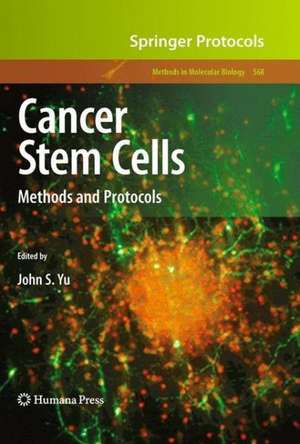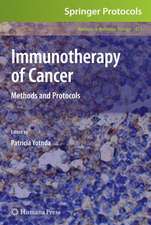Cancer Stem Cells: Methods and Protocols: Methods in Molecular Biology, cartea 568
Editat de John S. Yuen Limba Engleză Paperback – 9 aug 2012
| Toate formatele și edițiile | Preț | Express |
|---|---|---|
| Paperback (1) | 722.69 lei 22-36 zile | |
| Humana Press Inc. – 9 aug 2012 | 722.69 lei 22-36 zile | |
| Hardback (1) | 691.72 lei 38-44 zile | |
| Humana Press Inc. – 17 aug 2009 | 691.72 lei 38-44 zile |
Din seria Methods in Molecular Biology
- 9%
 Preț: 791.59 lei
Preț: 791.59 lei - 23%
 Preț: 598.56 lei
Preț: 598.56 lei - 20%
 Preț: 882.95 lei
Preț: 882.95 lei -
 Preț: 252.04 lei
Preț: 252.04 lei - 5%
 Preț: 802.69 lei
Preț: 802.69 lei - 5%
 Preț: 729.61 lei
Preț: 729.61 lei - 5%
 Preț: 731.43 lei
Preț: 731.43 lei - 5%
 Preț: 741.30 lei
Preț: 741.30 lei - 5%
 Preț: 747.16 lei
Preț: 747.16 lei - 15%
 Preț: 663.45 lei
Preț: 663.45 lei - 18%
 Preț: 1025.34 lei
Preț: 1025.34 lei - 5%
 Preț: 734.57 lei
Preț: 734.57 lei - 18%
 Preț: 914.20 lei
Preț: 914.20 lei - 15%
 Preț: 664.61 lei
Preț: 664.61 lei - 15%
 Preț: 654.12 lei
Preț: 654.12 lei - 18%
 Preț: 1414.74 lei
Preț: 1414.74 lei - 5%
 Preț: 742.60 lei
Preț: 742.60 lei - 20%
 Preț: 821.63 lei
Preț: 821.63 lei - 18%
 Preț: 972.30 lei
Preț: 972.30 lei - 15%
 Preț: 660.49 lei
Preț: 660.49 lei - 5%
 Preț: 738.41 lei
Preț: 738.41 lei - 18%
 Preț: 984.92 lei
Preț: 984.92 lei - 5%
 Preț: 733.29 lei
Preț: 733.29 lei -
 Preț: 392.58 lei
Preț: 392.58 lei - 5%
 Preț: 746.26 lei
Preț: 746.26 lei - 18%
 Preț: 962.66 lei
Preț: 962.66 lei - 23%
 Preț: 860.21 lei
Preț: 860.21 lei - 15%
 Preț: 652.64 lei
Preț: 652.64 lei - 5%
 Preț: 1055.50 lei
Preț: 1055.50 lei - 23%
 Preț: 883.85 lei
Preț: 883.85 lei - 19%
 Preț: 491.88 lei
Preț: 491.88 lei - 5%
 Preț: 1038.84 lei
Preț: 1038.84 lei - 5%
 Preț: 524.15 lei
Preț: 524.15 lei - 18%
 Preț: 2122.34 lei
Preț: 2122.34 lei - 5%
 Preț: 1299.23 lei
Preț: 1299.23 lei - 5%
 Preț: 1339.10 lei
Preț: 1339.10 lei - 18%
 Preț: 1390.26 lei
Preț: 1390.26 lei - 18%
 Preț: 1395.63 lei
Preț: 1395.63 lei - 18%
 Preț: 1129.65 lei
Preț: 1129.65 lei - 18%
 Preț: 1408.26 lei
Preț: 1408.26 lei - 18%
 Preț: 1124.92 lei
Preț: 1124.92 lei - 18%
 Preț: 966.27 lei
Preț: 966.27 lei - 5%
 Preț: 1299.99 lei
Preț: 1299.99 lei - 5%
 Preț: 1108.51 lei
Preț: 1108.51 lei - 5%
 Preț: 983.72 lei
Preț: 983.72 lei - 5%
 Preț: 728.16 lei
Preț: 728.16 lei - 18%
 Preț: 1118.62 lei
Preț: 1118.62 lei - 18%
 Preț: 955.25 lei
Preț: 955.25 lei - 5%
 Preț: 1035.60 lei
Preț: 1035.60 lei - 18%
 Preț: 1400.35 lei
Preț: 1400.35 lei
Preț: 722.69 lei
Preț vechi: 760.73 lei
-5% Nou
Puncte Express: 1084
Preț estimativ în valută:
138.29€ • 144.75$ • 115.10£
138.29€ • 144.75$ • 115.10£
Carte disponibilă
Livrare economică 10-24 martie
Preluare comenzi: 021 569.72.76
Specificații
ISBN-13: 9781617797538
ISBN-10: 1617797537
Pagini: 300
Ilustrații: XVI, 284 p. 58 illus., 16 illus. in color.
Dimensiuni: 193 x 260 x 16 mm
Greutate: 0.59 kg
Ediția:2009
Editura: Humana Press Inc.
Colecția Humana
Seria Methods in Molecular Biology
Locul publicării:Totowa, NJ, United States
ISBN-10: 1617797537
Pagini: 300
Ilustrații: XVI, 284 p. 58 illus., 16 illus. in color.
Dimensiuni: 193 x 260 x 16 mm
Greutate: 0.59 kg
Ediția:2009
Editura: Humana Press Inc.
Colecția Humana
Seria Methods in Molecular Biology
Locul publicării:Totowa, NJ, United States
Public țintă
ResearchCuprins
Defining Cancer Stem Cells by Xenotransplantation in Zebrafish.- Analysis of Cancer Stem Cell Metastasis in Xenograft Animal Models.- Identification of Murine and Human Acute Myeloid Leukemia Stem Cells.- Methods for Analysis of Brain Tumor Stem Cell and Neural Stem Cell Self-Renewal.- Prospective Identification of Cancer Stem Cells with the Surface Antigen CD133.- Neurosphere Culture and Human Organotypic Model to Evaluate Brain Tumor Stem Cells.- Methodologies in Assaying Prostate Cancer Stem Cells.- Characterization of Nonmalignant and Malignant Prostatic Stem/Progenitor Cells by Hoechst Side Population Method.- Anchorage-Independent Growth of Prostate Cancer Stem Cells.- Identification of Human Pancreatic Cancer Stem Cells.- Cancer Stem Cells in Head and Neck Squamous Cell Carcinoma.- Pituitary Adenoma Stem Cells.- Genome-Wide DNA Methylation Profiling: The mDIP-Chip Technology.- The Contribution of Niche-Derived Factors to the Regulation of Cancer Cells.- Dendritic Cell Vaccines for Cancer Stem Cells.- Maintaining and Engineering Neural Stem Cells for Delivery of Genetically Encoded Therapy to Brain Tumors.- Measurement of Multiple Drug Resistance Transporter Activity in Putative Cancer Stem/Progenitor Cells.
Recenzii
From the reviews:
“This volume in the popular Methods in Molecular Biology series provides a state-of-the art compendium of research techniques and protocols for identifying and culturing rare populations of cancer stem cells. … The audience includes basic science and clinical researchers who are interested in stem cell biology as well as mechanisms of carcinogenesis and malignancy. The book also will be valued by biomedical scientists and clinicians interested in clinical oncology. … The topic is fascinating and clinically relevant.” (Bruce A. Fenderson, Doody’s Review Service, June, 2010)
“This volume in the popular Methods in Molecular Biology series provides a state-of-the art compendium of research techniques and protocols for identifying and culturing rare populations of cancer stem cells. … The audience includes basic science and clinical researchers who are interested in stem cell biology as well as mechanisms of carcinogenesis and malignancy. The book also will be valued by biomedical scientists and clinicians interested in clinical oncology. … The topic is fascinating and clinically relevant.” (Bruce A. Fenderson, Doody’s Review Service, June, 2010)
Textul de pe ultima copertă
Through the revolutionary concept of cancer stem cells, cancer research has been reinvigorated to study the role of these unique cells in cancer propagation and as targets of innovative therapies. In Cancer Stem Cells: Methods and Protocols, preeminent researchers have compiled cancer stem cell research techniques and protocols to promote healthy competition, discourse, and collaboration in this vital field. The volume covers extensive topics such as identification and isolation of cancer stem cells, animal models of cancer stem cells, methylation profiling, the contribution of the niche in the regulation of cancer stem cells, immunologic targeting, and the use of normal stem cells as a treatment, among other subjects. Written in the highly successful Methods in Molecular Biology™ series format, chapters include brief introductions to their respective topics, lists of the necessary materials and reagents, step-by-step, readily reproducible laboratory protocols, and expert notes on troubleshooting and avoiding known pitfalls.
Comprehensive and cutting-edge, Cancer Stem Cells: Methods and Protocols will aid scientists around the world in the furthering of our understanding of cancer initiation and propagation and, most importantly, in the development of novel targets for cancer therapy.
Comprehensive and cutting-edge, Cancer Stem Cells: Methods and Protocols will aid scientists around the world in the furthering of our understanding of cancer initiation and propagation and, most importantly, in the development of novel targets for cancer therapy.
Caracteristici
Provides easy to follow protocols in this technically challenging field Presents a cohesive review of a variety of methods to isolate, identify, and study cancer stem cells Is a timely contribution in this nascent field and will level the playing field of investigators of cancer stem cells Presents a comprehensive, step-by-step guide by leading researchers in the field of cancer stem cells Brings to light methods that have been mired in mystery Brings together divergent viewpoints and methods to isolate the same population of cells, from prospective isolation using surface markers to stem cell propagation assays








